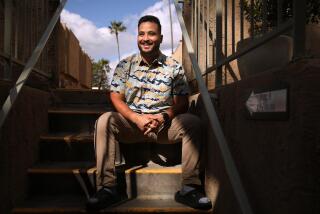The Fast Shuffle : Want to Be a Dealer? It’s No Big Deal
It sounds like an orchestra made up of nothing but castanets.
Resonant, ceaseless clicking, clicking. Rhythmic, staccato, measured, constant.
Close your eyes and listen to it and before long a primal urge takes over and you begin to reach for your wallet. Because there’s something about the sound of clattering poker chips that makes you want to get a bet down.
But at Hai Trinh’s school, the chips don’t represent real money, at least not in the short run. They are props, teaching aids, used to train a roomful of men and women in the precise art of card-dealing.
Trinh is co-owner of the Casino Card Dealers School in Westminster, a one-room launching pad for local card fanciers who want to deal in the card clubs of California (the closest such clubs are in Gardena and Bell Gardens). Graduates of the school are skilled in dealing super pan 9 (a form of baccarat), Asian poker and three other forms of poker: Texas hold ‘em, five-card draw and seven-card stud.
They come to the school, Trinh said, whenever they have time to spend in practice. At almost any time of the day, he said, students are working at one of the room’s four tables topped by green felt, repeating again and again the moves they’ll use daily as professional dealers. Students not dealing often act as players.
The action at the tables is quick and efficient. But is it difficult?
“Not at all,” said Trinh, 27, who lives in Garden Grove and deals professionally at the Bicycle Club in Bell Gardens. “It does take practice, and some people learn faster than others. It’s easier for people who have gambled before and know how it works. Usually, it takes about three months, but some people can do it in three weeks.”
Physical skill with the cards and the chips is not as important, Trinh said, as the mental ability to know which bets to pay off, which to rake in, which hands win, which hands lose.
“No, no, there’s not much physical skill at all,” he said. “You have to be neat and careful and alert. The hardest thing to do is to try to stay awake and alert late at night, because that’s when most of your business is. And there are all types of people in casinos, the good and the bad. So you have to stay alert all the time.”
However, he said, basic physical moves must be mastered absolutely. Students begin with the most elementary action, the actual dealing out, one by one, of the cards (called pitching ). They then progress to learning how to spot winning and losing hands, how to shuffle and finally how to oversee each of the games.
Most of his students, he said, either are unemployed or are unsatisfied with their current jobs and want to become professional dealers.
Trinh, who said he used to make his living gambling in Las Vegas, quit his studies as an electrical engineering major at Cal State Long Beach to become a dealer. His sister, a former electrical engineer, quit that profession and now also deals at a card club.
The money comes mostly from tips and tends to be erratic, but “you can live fairly comfortably,” Trinh said.
That is one of the prime motivations for Tinh Nguyen, 20, a student who lives in Westminster. He has been practicing at Trinh’s school for five months and said he will continue until next July when he turns 21 and becomes eligible to work in a card club.
“You make a lot of good money,” said Nguyen, “and it’s exciting and challenging. It’s fun for me because of working with numbers.”
A facile dealer, Nguyen handles stacks of chips with the aplomb of a veteran, quickly stacking and unstacking groups of four at a time, the professional dealer’s way of making quick change at the table.
However, Trinh said, great speed is not encouraged.
“We don’t need speed,” he said. “We need accuracy. After a while, if you go fast, you can see what’s happening, but the customers who come in maybe once a week can’t see what’s happening. You have to let them see.”
Smoothness is the rule. Even the simple act of pitching the cards should be evenly paced and graceful, and the dealer must, above all, not expose any of the cards in the process, Trinh said.
“They call it poetry in motion,” said Joe Allenby, 32, of Downey, a professional dealer and friend of Trinh’s who is spending time at the school learning to deal Asian poker in preparation for an “audition” at a card club. “To be smooth, it takes hours of practice. But it’s better than working.”
And the students do practice. If they aren’t dealing a game or acting as players, they may simply sit at the edge of one of the tables and pitch the cards into a stack on the other side, one after the other, first face down, then face up. Over and over.
It is all done, Trinh said, to develop the professional dealer’s most important asset: confidence.
“You must be friendly with the customers,” he said, “but you must always stay one step ahead. You have to always be sure of yourself. Sometimes a player tries to get away with something and makes you nervous. But it doesn’t matter what they say. You’re always right.”


